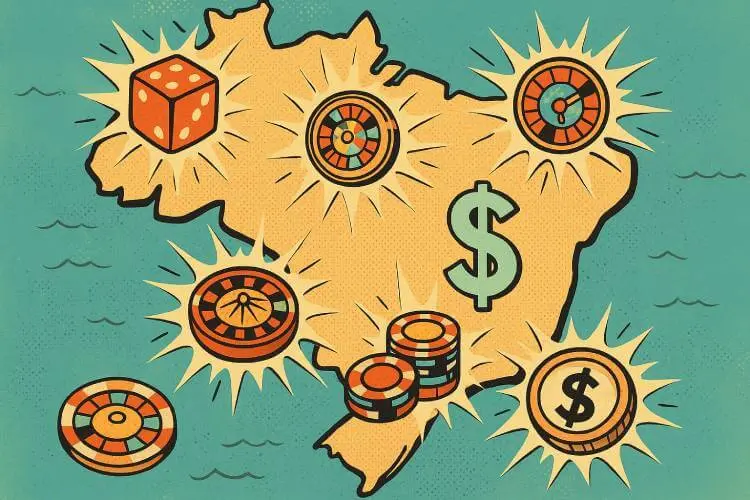Brazil to Release Key Public Opinion Poll on Casino Legalization

iGaming News, Blog, and Bonus Specialist

Brazil is approaching a crucial moment in its gambling reform efforts. On April 23, 2025, the DataSenado Institute will publish the results of a nationwide public opinion poll focused on the legalization of land-based casinos and broader gambling regulation. While online casinos and sports betting are already legal and rapidly expanding in Brazil, the country still bans physical casinos, a law that has been in place since 1946. The findings of this new poll could help determine whether lawmakers move forward with Bill PL 2,234/2022, which would legalize integrated resorts, bingo halls, and more.
Backed by Senator Irajá Abreu, the poll is intended to bring transparency to what remains a divisive issue. Brazil has banned land-based casinos since 1946, but pressure from economic sectors and the growing success of regulated online casinos and sports betting has brought the debate back into focus. With Brazil’s iGaming market projected to reach R$120 billion (US$21 billion) by the end of 2025, the stakes are high.
What the Poll Covers and Why It Matters
The poll, conducted from February 21 to March 1, surveyed Brazilians aged 16 and older by telephone. The central question? Whether citizens support lifting the nearly 80-year-old ban on land-based casinos and expanding regulated gambling to integrated resorts.
Bill PL 2,234/2022 proposes allowing one integrated resort casino per state, with up to three in larger states, such as São Paulo. The resorts would feature hotels, restaurants, entertainment venues, and gaming floors. Proponents argue that such developments could mirror the success of projects like Marina Bay Sands in Singapore, which generates more than $1 billion annually from its operations.
Tourism Minister Celso Sabino estimates that the legislation could generate R$22 billion in annual tax revenue and create between 600,000 and 1 million jobs. In a country with a growing tourism sector and increasing demand for entertainment, the proposal has garnered support from sectors seeking to capitalize on this momentum.
Pushback from Evangelical Leaders and Addiction Advocates
However, not everyone supports the move. Strong opposition has come from evangelical and conservative political groups, who cite the risk of addiction and social harm. Senator Eduardo Girão has chaired multiple Senate hearings focused on the dangers of problem gambling. In one session, Dr. Salomão Rodrigues Filho warned that gambling addiction could "destroy Brazilian football" if left unchecked.
Girão and others argue that casinos disproportionately affect low-income families. Citing international studies, they claim that legalized gambling often leads to increased household debt, mental health challenges, and job instability in vulnerable communities.
To address these concerns, Brazil’s gambling regulator, the Secretariat of Prizes and Bets (SPA), has announced new safeguards. These include the creation of a national self-exclusion registry and the development of updated advertising guidelines. Operators may be prohibited from using phrases like "easy money" or "guaranteed win" in their promotions.
Public Sentiment Could Tip the Scales
Bill PL 2,234/2022 passed the lower house of Congress in 2022 but has since stalled in the Senate due to political resistance. The legislation aims to regulate physical gambling venues such as casinos and bingo halls, as well as the street lottery known as "jogo do bicho."
The bill outlines that casino licenses would be auctioned based on financial and technical evaluations. Each licensed casino must be part of a larger integrated resort with at least 100 upscale hotel rooms. Meanwhile, bingo halls would only be permitted in cities with populations exceeding 200,000 or inside major stadiums.
Although online casinos and sports betting are governed separately under Brazil’s gaming laws, Senate President Rodrigo Pacheco has indicated that the poll results may also guide future adjustments to those regulations. If the public is broadly supportive of land-based casinos, it could also strengthen the arguments for revisiting or expanding rules for digital platforms.
Tourism, Employment, and Economic Impact
The economic argument in favor of legalization remains a strong one. Brazil welcomed 16.5 million international visitors in 2024, a 21% increase over pre-pandemic levels. With tourists increasingly drawn to major cities like Rio de Janeiro, integrated resorts could help extend stays and boost local economies. A proposed $20 billion casino resort in Rio’s Porto Maravilha, pitched by Las Vegas Sands, illustrates the level of investment on the table.
Senator Flexa Ribeiro has voiced his support for the bill, highlighting the potential of casinos to boost tourism infrastructure in underdeveloped regions, particularly in Brazil’s Northeast. However, he also emphasized the importance of strict regulation and responsible gaming measures to ensure that any economic gains are not offset by social harm.
What Comes Next
The release of the DataSenado poll on April 23 is expected to sway both public perception and senatorial votes. With three attempted votes on PL 2,234/2022 postponed in 2024, the Senate has been hesitant to move forward without a clearer picture of public sentiment.
If the results show strong support, the bill could advance to a final vote as early as May. If opposition outweighs support, lawmakers may hold off or request amendments.
Conclusion
Brazil is standing at a crossroads. The country’s regulated online gambling industry is already booming, and legalizing land-based casinos could provide an additional economic boost. But significant resistance remains, especially around the social costs of gambling.
The results of the April 23 DataSenado poll will help determine whether Brazil bets on casino expansion or maintains its current restrictions. Whatever the outcome, it will set the tone for gambling policy in the country for years to come.
